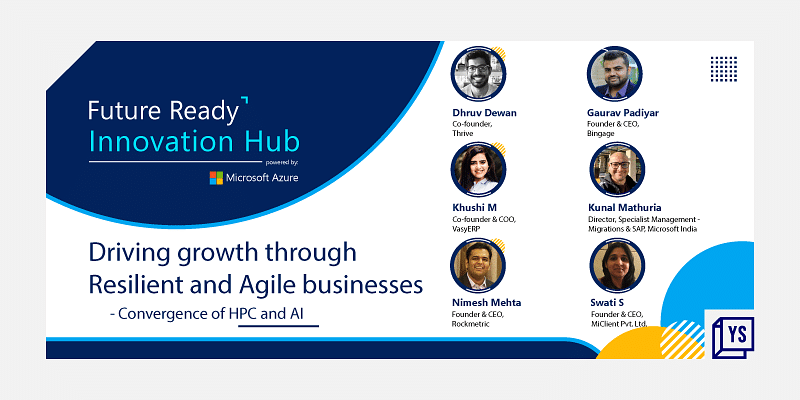“Customers must adapt or partner with technology providers having resiliency and security at their core offerings. A platform that provides technology services must incorporate building business models, feasible to quick changes, and agile enough to maneuver/outmaneuver. So, technology vendors and partners embracing resiliency, contingency, and security are great partners to look at,” said Kunal Mathuria, Director, Specialist Management – Migrations & SAP, Microsoft.
Kunal was speaking at a roundtable discussion titled ‘‘Driving growth through resilient and agile businesses’ co-presented by Microsoft and YourStory to explain imperative practices to make business processes and infrastructure agile and resilient.
Digital resiliency and business priorities
Companies are reinstating critical operational activities and procedures to prioritise continuity and viability. They focus on digital resilience to drive longer-term growth and galvanising focus on future disruptions.
Dhruv Dewan, Co-Founder, Thrive, emphasised understanding the goals, agility, and growth with a digital-first approach. Thrive believes in building customer loyalty, customer retention, and collecting their feedback to improve delivery services. “We can create a technology spectrum, communicate in a team, are measurable and added values within a system with right tools and products,” he added.
‘Champion the diversity in the face of adversity, said Gaurav Padiyar, Founder & CEO, Bingage. According to him, where becoming agile and flexible are need of the hour to grow faster, resiliency within the organization or founding team supports to stay ahead of competitors, scale faster and expand at a large scale.
For Khushi M, Co-founder & COO, VasyERP, business runs on three M: Money, Mind and Machine, i.e., money to expand innovation, mind (workforce) to organise data and transactions of enterprises and machine, an integral part of technology and growth for organisations. She spoke briefly about machines as digitalization and mind & money for business growth, expansion, and sustainability.
Rockmetric’s Founder and CEO, Nimesh Mehta highlighted that resiliency ensures businesses’ continuity, stability, and growth. He prioritised stability over resiliency and scalability of business in the particulars of talent, technology, and processes.
Swati S, Founder & CEO, MiClient Pvt. Ltd. talked to prioritise customer engagement, employee management, and vendor relationships. And also, according to types of business and employed technologies, she communicated about innovations, digital disruption, and cybersecurity than making digital resilience an essential priority.
How imperative agility is for business infrastructure?
Dhruv mentioned key areas to focus such as identifying areas of improvements in existing business infrastructure, strategies to retain customers, appropriate approaches to survive and thrive in unpredictable circumstances, and more. He also talked about ‘marketing automation tools’, ‘product-led approach’ and ‘SAS platform’ to scale businesses.
In speaking of Rockmetric, Nimish talked about how the company builds intelligent platforms, delivers in-depth insights at scale and offers business value, and lasts business impact. He also discussed three trends associated with digitalization: first is data-driven platforms to drive productivity and target audience, second is man, money, and machine as pointed out by VasyERP’s Khushi, and third is investing in cloud services, data pipelines, and technology [data analytics] to upgrade infrastructure.
Gaurav started talking about machine learning to obtain actionable intelligence helping to run personalised campaigns for huge ROI. For SMBs, Bingage develops some sort of algorithms to examine different types of data for customized products, services, and perosnalised campaigns for recommendations.
‘Go-to-cash-process for organizations making them more agile and functioning’, told Swati. According to her, companies are using multiple tools, preparing different quotations, sending emails, managing excel sheets, etc, so MiClient provides robust support by developing CRM platforms to manage everything in a single place.
To throw light on how VasyERP helps businesses and improve productivity, Khushi revealed, “We deal in two segments: Retail ERP and Enterprise ERP. To manage transactions, sales, purchase, deals, etc, an innovative platform [retail ERP.] includes different modules such as self-kiosk, omnichannel, e-commerce, multichain solutions, and Enterprise ERP deals in understanding obstacles of manufacturing units, HR management, sales, purchase, accounting, marketing challenges, etc.”
On asking about how Microsoft ensures solutions are in-sync with business requirements, Kunal spoke about their strategies to support business transformation and achieve their goals. At Microsoft, there are different teams of architects and specialists who work on varieties of solutions and services [consultative approach] from the portfolio of Microsoft Technologies.
Investing in digital tools for security and workplace connectivity
In order to compete with future demands, companies strive to stay ahead of the competition and achieve strategic outcomes. One best way is to invest in digital tools for security and real-time connectivity.
“Collectively, connectivity increases efficiency, we implemented OKR (objective key results) activity to make employees understand objectives of organizations. With certain tools, we set goals, make informed decisions, and have independent teams within organizations,” said Dhruv.
To stay ahead of the game, Nimish spoke about innovation, bringing modern technology, and competing with global players. He explained that communication, collaboration, documentation, and coding are critical drivers for digital innovation alongside as data security and services.
Gaurav shared his approach as product, team, and action for data-driven decisions when any disruption happens. According to him, investing in digital tools are necessary to be agile & flexible, and to control work management and accountability.
While VasyERP’s Khushi added notes on the necessity of digitalization and automation in businesses to better prepare and absorb radical market changes, MiClient’s Swati suggested employee automation processes. According to her, innovation is an effective tool in digital culture and how the company provides funds and time to employees to build small applications that benefit to company’s overall growth and sustainability.
Speaking about the requirements of cloud providers for automated services, Kunal mentioned, “Organizations must know when to go digital, partner with the right technology provider offering resilient, scalable, and flexible cloud solutions and services. To sustain against uncertainties, you must have access to platforms, for example, Microsoft Azure, that incorporates everything as security, resiliency, confidentiality, and data access to better respond for uncertain future events and be able to build effective digital journeys.”










